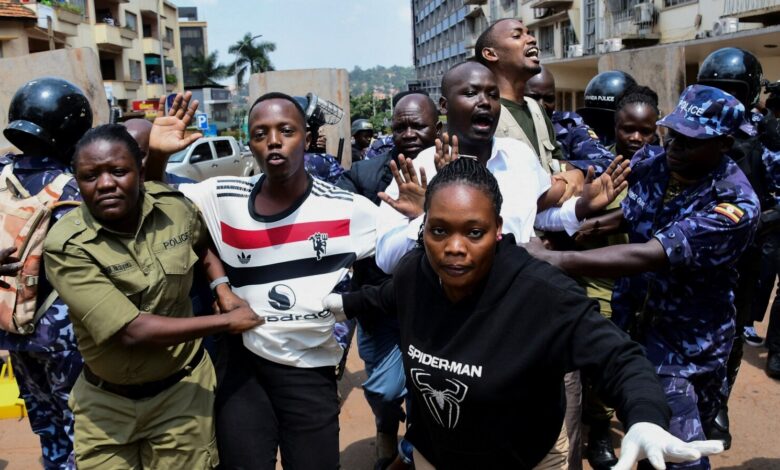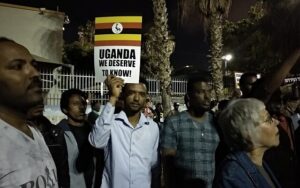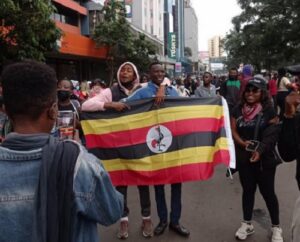How Europe’s Cash Grab is Turning African Countries into Refugee Dumping Grounds
European Commission to Propose Measures to Reinforce EU's Position on Migration in Response to Pressure from Governments Throughout the Union.

Brussels, Oct 19 – Imagine fleeing your home country in search of safety in a foreign land, only to be deported to another country with a notorious history of human rights abuses. This chilling reality looms for asylum seekers under a controversial proposal by the Dutch government to send them to Uganda. The proposal has drawn strong criticism from human rights defenders, who warn of serious risks for those affected if the Dutch plan is approved, citing Uganda’s poor human rights record.
Dutch Prime Minister Dick Schoof while addressing reporters in Brussels during the October 16, EU’s Council summit, confirmed that the Netherlands government was seriously considering the plan to deport rejected African asylum seekers to Uganda. He said, “It is a serious plan, but a lot still needs to be worked out,” while acknowledging that its feasibility remained uncertain. However, Schoof stressed the need to “explore all options” to manage the increasing number of asylum seekers arriving in the Netherlands.
Further adding weight to the proposal, the Dutch Minister of Foreign Trade and Development Cooperation, Reinette Klever, reiterated the plan during a visit to Uganda on October 18. Klever, a far-right politician, stated that Minister of Migration and Asylum Marjolein Faber was working on the plan to deport asylum seekers from African countries who had exhausted all legal avenues in the Netherlands to Uganda, from where they would be sent back to their countries of origin. “Ultimately, we want to curb migration,” Minister Klever said. According to Klever, the Ugandan government was seemingly not opposed to the idea and would receive financial compensation in return.

However, Uganda’s response has been divided. Foreign Affairs Minister, Jeje Odongo, told Dutch broadcaster NOS in an interview on October 16 that the country was “open to any discussions.” However, a day later, State Minister for Foreign Affairs Henry Oryem Okello contradicted this stance, rejecting the Dutch proposal. Okello said that Uganda, already hosting over 1.6 million refugees, was not prepared to accept more asylum seekers. He questioned why European countries would deport refugees when Uganda itself does not, raising concerns over Europe’s approach to migration.
In the Netherlands, opposition lawmakers criticized the proposal. Green Left party leader Jesse Klaver argued it was a distraction from the government’s failure to address domestic issues while Rob Jetten of D66 called the plan “totally unfeasible and ill-conceived”, citing the failed attempts by Denmark and the UK to implement similar policies.
The Dutch plan reflects a broader European recent trend of creating “return hubs” outside the EU to expedite the deportation of rejected asylum seekers and reduce migration flows. While some countries, like Italy, which recently tried to deport migrants to non-EU countries such as Albania, these efforts have faced legal challenges. All 16 asylum seekers in the initial group were returned to Italy according to media reports.
Critics argue that financial incentives are driving these deals, as seen with the UK’s controversial arrangement with Rwanda. The UK pledged £272 million to Rwanda in exchange for its cooperation in relocating refugees. According to UK Home Secretary Yvette Cooper, the total estimated cost of the failed Rwanda deportation scheme amounted to £700 million of taxpayers’ money under the Conservative government.
The UK’s plan to send migrants to Rwanda faced significant legal and ethical challenges. Passed in April under Prime Minister Rishi Sunak’s Conservative government, it was later scrapped by Prime Minister Keir Starmer’s Labour administration when it took over in July. Human rights groups labeled the plan as inhumane, and EU leaders questioned its morality. Nonetheless, similar strategies have been embraced by several European countries.

The European Union has also struck deals with North African nations, including Egypt, Tunisia, and Libya, offering substantial financial aid to prevent migrant departures. Yet critics argue that financial deals with African governments are not a sustainable solution, especially given concerns about safety and human rights in these countries.
Immigration and repatriation was a key issue at the EU leaders’ summit in Brussels last week, where the growing influence of right-wing parties was evident. Earlier, on October 10, EU Home Affairs Ministers had gathered in Luxembourg, where they tasked experts with finding “innovative ideas” to improve the bloc’s 27 member states return system for irregular and rejected migrants. The European Union is expected to introduce new “tougher measures” aimed at strengthening border procedures by June 2026. EU member countries will either need to accept asylum seekers from frontline states or contribute financial support.
Last year, the number of irregular migrants and refugees arriving in Europe was less than a third of the one million recorded during the 2015 migration crisis. According to data from the EU’s Frontex border agency, this figure dropped further to 166,000 in the first nine months of this year.
However, while the number of asylum seekers has decreased, concerns over where they are being sent remain significant. Uganda’s troubling human rights record makes it an especially concerning destination for deported asylum seekers. The country has faced international condemnation for its laws targeting LGBTQ+ individuals and its history of arbitrary arrests, torture, and suppression of political opposition. Refugees from neighboring countries, including South Sudan and the Democratic Republic of Congo, have faced discrimination and violence from local communities. Meanwhile, human rights defenders have been harassed, imprisoned, or intimidated for their efforts to protect vulnerable populations. Critics warn that sending asylum seekers to such environments violates international law and human rights principles.
Otsieno Namwaya, Associate Africa Director at Human Rights Watch, stressed that both Uganda and the Netherlands must honor their international obligations under the principle of non-refoulement, which prohibits returning documented refugees or individuals to countries where they face a significant risk of persecution, harm, or violations of their rights. The principle of non-refoulement is crucial in safeguarding refugees from being returned to places where they could face severe threats to their lives or freedoms.

He emphasized, “Forcibly deporting asylum seekers who fear for their lives violates international refugee law, as outlined in the 1951 Refugee Convention.” Namwaya highlighted that Uganda and all UN member states have a duty to protect refugees from being sent back to dangerous conditions.
According to the 2024 Human Rights Watch report, despite slight improvements in 2023, Uganda’s human rights situation remains dire. Repressive laws were overturned, but security forces continue to target protesters, opposition supporters, and journalists with fabricated charges. Civil society groups, particularly those advocating for human rights, face increasing restrictions. The passage of the Anti-Homosexuality Act, imposing severe penalties, has drawn widespread international condemnation.
“It’s appalling that the Dutch government is considering relocating rejected asylum seekers to Uganda,” said Richard Serunkuuma, an Executive Director of Positive Men’s Union (POMU), a group advocating and promoting positive attitudes and beliefs among men living with HIV/AIDS in Uganda. He condemned the proposal as punitive, aimed at deterring others from fleeing atrocities by their governments. Given Uganda’s existing tensions with host communities over land encroachment and strained social services, he argued that it should not be entertained..
Serunkuum also pointed to the August 2023 closure of the UN Human Rights Office in Uganda due to the UN agency’s stance against anti- LGBTQ+ law and the existence of political prisoners labeled as ‘terrorists’ as signs of the country’s poor human rights record. Ugandan human rights defenders also cited past cases of Rwandese nationals forcibly deported under national security and accusations of being involved in subversive activities claims during former Inspector General of Police Gen. Kale Kayihura’s tenure.

A Ugandan asylum seeker, who requested anonymity due to protection in an East African country, condemned the Dutch proposal. He stated that by agreeing to deport asylum seekers to countries with troubling human rights records, European governments send a dangerous message: that human rights are negotiable when it suits national interests.
This undermines their credibility as champions of human rights and sets a harmful precedent. Rather than outsourcing responsibilities, the Dutch government should focus on creating safe, legal pathways for asylum seekers and addressing the root causes of forced migration. “They should invest in development programs in conflict-affected regions and promote human rights and democracy globally,” he added.
Since coming to power in July, the Netherlands’ coalition government has pledged to implement the “toughest ever” immigration policy, focusing its attention on reducing asylum, even though the country receives an average number of asylum requests compared to other member states, according to EU data. According to the figures, the Netherlands received two first-time asylum applications per 1,000 residents last year, which was in line with the average for the entire EU. Greece, Germany, and Spain are among the ten member states that reported higher ratios.
Dr. John Sunday Ojo, a research fellow at NATO’s Veteran Initiative, highlighted the potential legal and ethical issues surrounding the deportation of asylum seekers to Uganda. He pointed out that while the Netherlands’ policy aligns with the broader EU migration framework, it will still require court approval. Dr. Ojo highlighted the diplomatic implications of such agreements, noting, “While these policies may strengthen diplomatic ties between the Netherlands and Uganda, they could also endanger the safety and dignity of asylum seekers.”